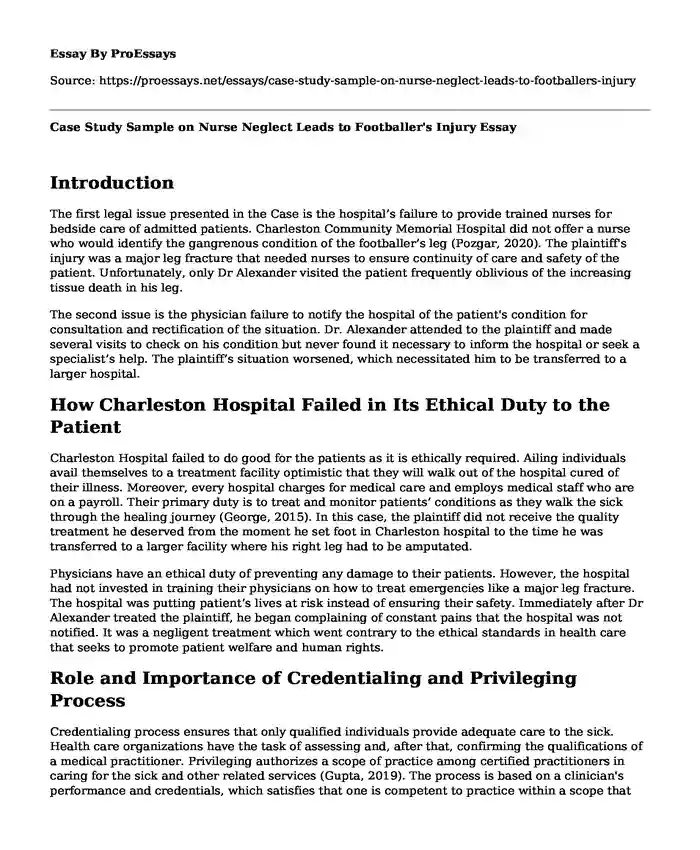Introduction
The first legal issue presented in the Case is the hospital’s failure to provide trained nurses for bedside care of admitted patients. Charleston Community Memorial Hospital did not offer a nurse who would identify the gangrenous condition of the footballer’s leg (Pozgar, 2020). The plaintiff's injury was a major leg fracture that needed nurses to ensure continuity of care and safety of the patient. Unfortunately, only Dr Alexander visited the patient frequently oblivious of the increasing tissue death in his leg.
The second issue is the physician failure to notify the hospital of the patient's condition for consultation and rectification of the situation. Dr. Alexander attended to the plaintiff and made several visits to check on his condition but never found it necessary to inform the hospital or seek a specialist’s help. The plaintiff’s situation worsened, which necessitated him to be transferred to a larger hospital.
How Charleston Hospital Failed in Its Ethical Duty to the Patient
Charleston Hospital failed to do good for the patients as it is ethically required. Ailing individuals avail themselves to a treatment facility optimistic that they will walk out of the hospital cured of their illness. Moreover, every hospital charges for medical care and employs medical staff who are on a payroll. Their primary duty is to treat and monitor patients’ conditions as they walk the sick through the healing journey (George, 2015). In this case, the plaintiff did not receive the quality treatment he deserved from the moment he set foot in Charleston hospital to the time he was transferred to a larger facility where his right leg had to be amputated.
Physicians have an ethical duty of preventing any damage to their patients. However, the hospital had not invested in training their physicians on how to treat emergencies like a major leg fracture. The hospital was putting patient’s lives at risk instead of ensuring their safety. Immediately after Dr Alexander treated the plaintiff, he began complaining of constant pains that the hospital was not notified. It was a negligent treatment which went contrary to the ethical standards in health care that seeks to promote patient welfare and human rights.
Role and Importance of Credentialing and Privileging Process
Credentialing process ensures that only qualified individuals provide adequate care to the sick. Health care organizations have the task of assessing and, after that, confirming the qualifications of a medical practitioner. Privileging authorizes a scope of practice among certified practitioners in caring for the sick and other related services (Gupta, 2019). The process is based on a clinician's performance and credentials, which satisfies that one is competent to practice within a scope that has been specified in the facility.
The importance of credentialing and privileging process is to ensure that health organizations and health caregivers offer services that are appropriate not only in scope but also in quality (Mag, 2013). The two processes see that practitioners are up to the task with the job they are hired to do. Most importantly, credentialing protects organizations against any potential lawsuits, which often results in hefty fines.
Conclusion
In the darling case, it is evident that Charleston hospital did not perform Credentialing and Privileging Process on Dr. Alexander, a general practitioner in the facility. Injuries like major leg fractures need high-quality physicians to treat a patient. However, the doctor had not treated such an injury for three years, and the chances were, the process might go wrong. Unfortunately, the college football player began to continually complain of pain after the cast had been applied. This shows that Dr. Alexander was not qualified, and neither had the hospital assessed him to confirm his qualifications. The result was that Charleston hospital faced a lawsuit which the plaintiff won and was awarded $100,000 in compensation. The physician settled his case out of court and paid $40,000. The hefty fine and plaintiff’s leg amputation could have been avoided if the hospital had reviewed the physician’s scope of practice and, after that, issue him specific privileges all in writing.
References
George, R. (2015). The Moral Responsibility of the Hospital. Journal of Medicine and Philosophy, 7(1), 87–100. https://doi.org/10.1093/jmp/7.1.87
Gupta, R. (2016, August 19). Credentialing and Its Importance in Healthcare Staffing. LinkedIn. https://www.linkedin.com/pulse/credentialing-its-importance-healthcare-staffing-reena-gupta.
Mag, H. M. T. (2013, July 18). Importance of Credentialing and privileging. StackPath. https://www.hcinnovationgroup.com/home/article/13003949/medical-credentialing-more-to-good-health-than-meets-the-eye.
Pozgar, G. (2020). Legal and ethical issues for health professionals (5th ed.). Jones & Bartlett Learning.
Cite this page
Case Study Sample on Nurse Neglect Leads to Footballer's Injury. (2023, Oct 17). Retrieved from https://proessays.net/essays/case-study-sample-on-nurse-neglect-leads-to-footballers-injury
If you are the original author of this essay and no longer wish to have it published on the ProEssays website, please click below to request its removal:
- Book Analysis of Medical Apartheid, Authored by Harriet Washington
- Paper Example on EBP in Mental and Behavioral Health Facility
- HIV/AIDS Science and Society Essay Example
- Comparing Articles on Nuclear Weapons Essay Example
- Breast Cancer Case Study
- Age & Healthcare Providers: Understanding Interactions - Essay Sample
- Opioid Overdose: A Serious Public Health Challenge - Report Example







